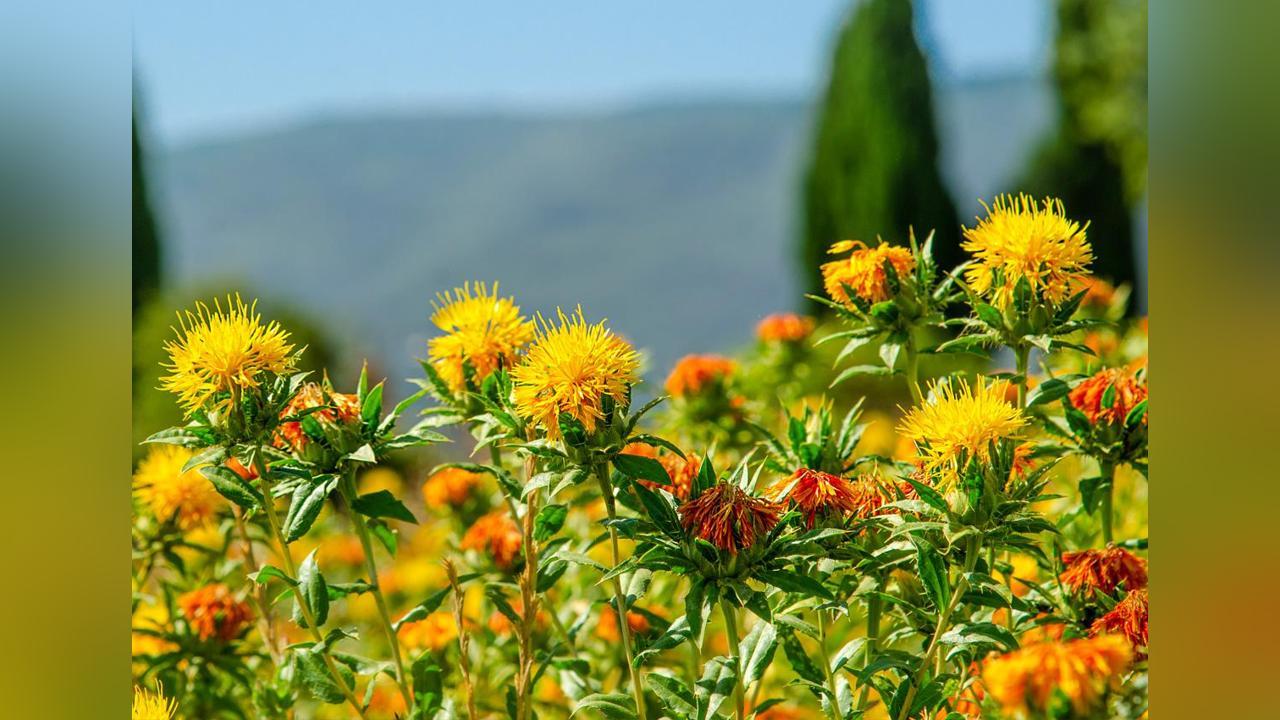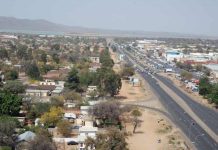Africa-Press – Botswana. It is the Chobe Agricultural Show and masses are gravitating towards the Chema Chema stall in the right corner where the Panda safflower growers are showcasing.
Understandably so, the buzz has been flying around about a game changer crop that reduces risk of heart diseases, lowers blood pressure and cholesterol, colours food, produces high value organic oil and many other benefits still to be unearthed.
Panda Safflower Growers, is a consortium of four resilient farmers whose curious minds and passion for farming landed them in Metsimotlhabe where they got acquainted with safflower from another farmer.
Unsurprisingly, a keen interest was activated as they acquired safflower seeds and came back home in Pandamatenga where in 2023 the team leader, Mr Solomon Tshenyo planted the seeds for multiplication.
February 2024, Mr Tshenyo offered his 100-hectare farm to three of his associates as they joined hands and ploughed the safflower.
As expected, the safflower hype caught President Dr Mokgweetsi Masisi who visited the farm for appreciation after officiating at the Chobe Agricultural Show recently.
In an interview, Mr Tshenyo expressed joy over President Masisi’s visit where the former shared their story, advantages of safflower as a drought resistant crop, its health benefits and value chain opportunities.
The farmer said they ploughed the seeds in February, henceforth extreme heat followed and it did not rain until April.
“We got surprised when we saw the sprouting because the weather conditions were unfavorable but that 80 millimetres rain in April was a turnaround for us,” he explained.
He pointed out that they ploughed through Temo Letlotlo as safflower was part of the crops included in the guidelines.
He said the crop was drought resistant and not demanding, as they did not apply any fertilisers to the soil, adding that upon realising that pests were attacking the crops, they put the ladybug insects to consume the aphids hence making the treatment organic.
Mr Tshenyo stated that the crops would be harvested at the end of August expecting a total of 70 tonnes.
However, he said the harvest could have been more if was not because of the extreme drought.
The farmer indicated that through collaborations with the Botswana University of Agriculture and Natural Resources (BUAN), they learnt about the benefits of safflower and how they could fully explore it.
Currently, he said, the Panda Safflower Growers was selling the safflower seeds, the petals for tea and looking into extracting oil in future.
An in-depth research carried out By BUAN steered by Professor of Horticulture, Vallantino Emongor, in collaboration with United States of America Department of Agriculture, obtained multiple benefits of the safflower crop, which were subsequently cascaded to farmers in Mestimotlhabe, Rakops and Pandamatenga.
Professor Emongor revealed in an interview that research commenced in 2008 in collaboration with the USA where upon completion, the US furnished BUAN with 300 varieties of safflower, which they distributed to Batswana farmers in 2019.
He explained that safflower could be consumed as a vegetable at four to six weeks after planting it, then cut for silage at 70 days maturity for livestock feed adding that the petals had medicinal value as they treated high blood pressure, sugar diabetics, arthritis and improve blood circulation.
He pointed out that upon maturity, the seeds produce oil that could be extracted for cooking and production of beauty cosmetics.
“Safflower produces organic oil even better than olive oil, which is why international markets sell a litter at US$35 to US$46 , equivalent to P400/P500 per litter because the oil is very saturated so the value is very high,” he noted.
The stalk, he said, could be put in a hammer mill after harvesting to produce roughage, which he noted had proven to be a lucrative business to venture into.
Professor Emongor highlighted that a group of women in Rakops, who suffered gender-based violence (GBV), formed a corporative and ploughed safflower then harvest the stalk, grind and package it as animal feed to sell.
In addition, he noted that safflower seeds could be extracted to biodiesel if produced in excess to follow in the steps of University of Botswana as producers of biodiesel from safflower.
“All we need to do is get investors, produce in mass and be self sufficient in oil, animal feed and even sell to other countries,” he added.
Accompanying President Masisi during the farm visit was the Minister of Agriculture, Mr Fidelis Molao, who stated that safflower is a ground-breaking crop projected to change the agro industry due to its resilience against extreme drought.
He stated that research conducted by BUAN unpacked the health benefits and its cash crop potential once extracted for oil by-products.
Mr Molao said it was brilliant that the farmers had ploughed the crop through the Temo Letlotlo programme hence encouraged them to explore the programme even more and commission boreholes for irrigation in order to optimise on their harvest in future seasons.
“Pandamatenga, like the rest of the country, experienced drought this year.
However, safflower managed to withstand this drought and ripened so it is a very interesting crop that I encourage other Batswana to come benchmark here,” the minister remarked.
The Minister further remarked that the crop presented many opportunities, adding that it was essential that the Pandamatenga farmers partnered with the National Agricultural Research and Developement Institute (NARDI) for multiplication and sell to many other Batswana.
For More News And Analysis About Botswana Follow Africa-Press






